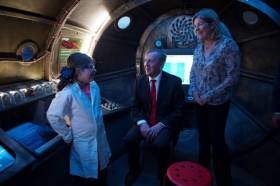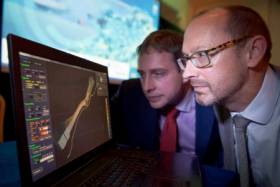Displaying items by tag: Blue Tech
#MarineScience - The combination of serious scientific research being done in and out of Galway as well as the city’s location as an ocean gateway makes it an ideal location to stage an event like SeaFest.
That’s according to Dr Peter Heffernan, CEO of the Marine Institute, who spoke ahead of Ireland’s national maritime festival, which starts today (Friday 30 June) with the fourth Our Ocean Wealth Summit.
Dr Heffernan was in NUI Galway yesterday for Digital Ocean, a one-day conference exploring the potential of ‘blue tech’ now in its second year.
SeaFest, he said, “is happening at a time when Ireland is becoming a global hub for blue technology, with a number of companies providing world-class expertise in specialised areas of the marine sector such as data analytics, marine electronics, and the design and build of offshore vessels.”
Yesterday also saw Bord Iascaigh Mhara’s National Seafood Conference, ‘Winning in a Changing Environment’ take place on the eve of SeaFest 2017, with leading seafood industry experts and commentators focusing on sustainability and innovation and the latest polices shaping the global seafood industry.
#BlueTech - Enabling a connected ocean presents enormous opportunities for the Irish marine sector, with this country fast becoming a global hub for the Blue Internet of Things — the collective term for sea-related connected devices.
The growing market opportunities Ireland has to offer in this area will be discussed at a major ‘blue tech’ conference, Digital Ocean, next Thursday 29 June at NUI Galway ahead of SeaFest 2017, Ireland’s national maritime festival.
“Surrounded by the ocean, and already a global tech hub, Ireland has real capabilities across key enabling technologies required to drive blue tech innovation including nanotechnology, sensors, data analytics, robotics, communication technologies and advanced materials,” says Dr Edel O’Connor of the Irish Maritime Development Office (IMDO).
“We also have a number of Irish companies providing world-class expertise and exporting in specialised areas of the marine sector such as data analytics, design and build of offshore vessels, offshore support services, marine electronics, engineering and other areas.
“Leveraging these critical factors, Ireland is poised to be at the forefront of IoT for the Sea, and with this in mind, we are bringing together the major players at the Digital Ocean event on 29 June in Galway.”
International speakers from Rolls Royce, Kongsberg Maritime, Saildrone, Wilhelmsen Group, Dell EMC, ASV Global and other global companies will address the Digital Ocean event alongside local blue tech success stories such as OpenHydro, Cathx Ocean and Eire Composites.
The event is being organised by the IMDO with Enterprise Ireland, IDA Ireland, Marine Institute, Sustainable Energy Authority of Ireland and Science Foundation Ireland.
Last year’s Digital Ocean saw the launch of the SmartBay Subsea Observatory, representing a major step forward for the marine IoT.
This year’s conference will also feature a trade show on the grounds of NUI Galway that will mark the first gathering of a newly established Irish Marine Industry Network (IMIN).
Led by industry and supported by Enterprise Ireland and the IMDO, the network will seek to position Ireland at the forefront of marine innovation through maximising collaboration and cross-sectoral opportunities. Over 60 organisations are already signed up to exhibit at the Marine Trade Show.
The Digital Ocean conference will be relevant to organisations involved in offshore renewable energy, maritime monitoring and security, marine biotechnology, marine mining and exploration, offshore oil and gas, shipping, fisheries and aquaculture.
Companies with technologies in areas such as data analytics, sensors, communications technologies, advanced materials, robotics and autonomy, will also learn about opportunities to target this sector as a new area for growing their business.
Digital Ocean takes place one day prior to the fourth annual Our Ocean Wealth Summit sponsored by PwC Ireland, as previously reported on Afloat.ie.

























































